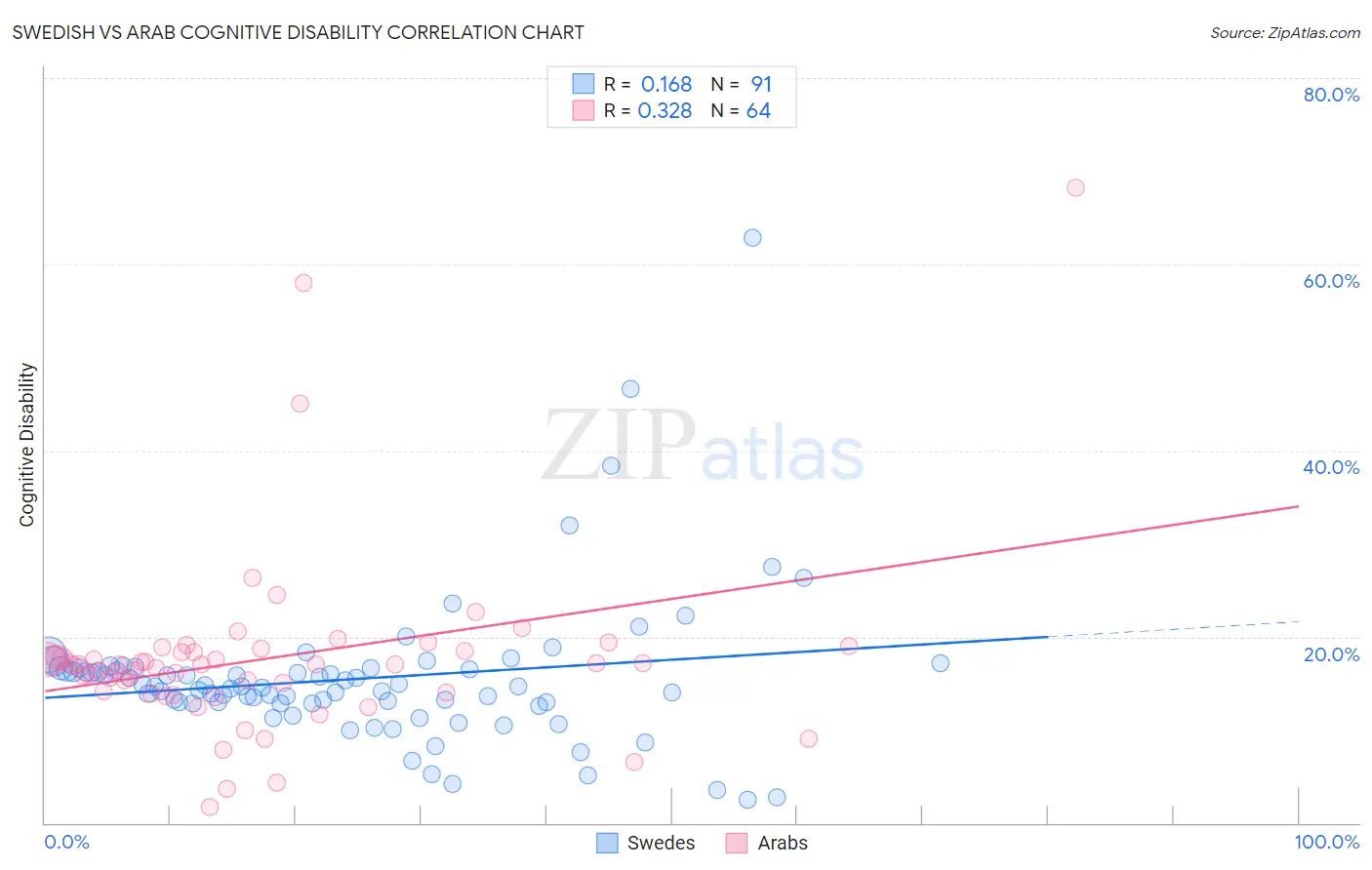Swedish vs Arab Cognitive Disability
COMPARE
Swedish
Arab
Cognitive Disability
Cognitive Disability Comparison
Swedes
Arabs
16.5%
COGNITIVE DISABILITY
99.8/ 100
METRIC RATING
53rd/ 347
METRIC RANK
17.3%
COGNITIVE DISABILITY
42.8/ 100
METRIC RATING
182nd/ 347
METRIC RANK
Swedish vs Arab Cognitive Disability Correlation Chart
The statistical analysis conducted on geographies consisting of 539,118,311 people shows a poor positive correlation between the proportion of Swedes and percentage of population with cognitive disability in the United States with a correlation coefficient (R) of 0.168 and weighted average of 16.5%. Similarly, the statistical analysis conducted on geographies consisting of 486,790,065 people shows a mild positive correlation between the proportion of Arabs and percentage of population with cognitive disability in the United States with a correlation coefficient (R) of 0.328 and weighted average of 17.3%, a difference of 4.8%.

Cognitive Disability Correlation Summary
| Measurement | Swedish | Arab |
| Minimum | 2.5% | 1.6% |
| Maximum | 62.8% | 68.2% |
| Range | 60.2% | 66.6% |
| Mean | 15.5% | 17.7% |
| Median | 14.6% | 17.1% |
| Interquartile 25% (IQ1) | 12.9% | 14.1% |
| Interquartile 75% (IQ3) | 16.6% | 18.4% |
| Interquartile Range (IQR) | 3.7% | 4.3% |
| Standard Deviation (Sample) | 8.1% | 10.1% |
| Standard Deviation (Population) | 8.0% | 10.0% |
Similar Demographics by Cognitive Disability
Demographics Similar to Swedes by Cognitive Disability
In terms of cognitive disability, the demographic groups most similar to Swedes are Immigrants from Iran (16.5%, a difference of 0.040%), Soviet Union (16.5%, a difference of 0.060%), Immigrants from Korea (16.5%, a difference of 0.10%), Immigrants from Venezuela (16.5%, a difference of 0.13%), and Iranian (16.5%, a difference of 0.15%).
| Demographics | Rating | Rank | Cognitive Disability |
| Immigrants | Colombia | 99.8 /100 | #46 | Exceptional 16.5% |
| Immigrants | Italy | 99.8 /100 | #47 | Exceptional 16.5% |
| Immigrants | North America | 99.8 /100 | #48 | Exceptional 16.5% |
| Iranians | 99.8 /100 | #49 | Exceptional 16.5% |
| Norwegians | 99.8 /100 | #50 | Exceptional 16.5% |
| Immigrants | Korea | 99.8 /100 | #51 | Exceptional 16.5% |
| Soviet Union | 99.8 /100 | #52 | Exceptional 16.5% |
| Swedes | 99.8 /100 | #53 | Exceptional 16.5% |
| Immigrants | Iran | 99.8 /100 | #54 | Exceptional 16.5% |
| Immigrants | Venezuela | 99.7 /100 | #55 | Exceptional 16.5% |
| Austrians | 99.7 /100 | #56 | Exceptional 16.6% |
| Bhutanese | 99.7 /100 | #57 | Exceptional 16.6% |
| Pennsylvania Germans | 99.7 /100 | #58 | Exceptional 16.6% |
| Immigrants | Peru | 99.7 /100 | #59 | Exceptional 16.6% |
| Romanians | 99.7 /100 | #60 | Exceptional 16.6% |
Demographics Similar to Arabs by Cognitive Disability
In terms of cognitive disability, the demographic groups most similar to Arabs are Immigrants from Guyana (17.3%, a difference of 0.0%), Pakistani (17.3%, a difference of 0.030%), Spaniard (17.3%, a difference of 0.070%), Crow (17.3%, a difference of 0.11%), and Afghan (17.3%, a difference of 0.14%).
| Demographics | Rating | Rank | Cognitive Disability |
| Tsimshian | 49.8 /100 | #175 | Average 17.3% |
| Shoshone | 49.2 /100 | #176 | Average 17.3% |
| Ute | 49.1 /100 | #177 | Average 17.3% |
| Spanish | 48.9 /100 | #178 | Average 17.3% |
| Sioux | 48.6 /100 | #179 | Average 17.3% |
| Pakistanis | 43.9 /100 | #180 | Average 17.3% |
| Immigrants | Guyana | 42.9 /100 | #181 | Average 17.3% |
| Arabs | 42.8 /100 | #182 | Average 17.3% |
| Spaniards | 40.3 /100 | #183 | Average 17.3% |
| Crow | 39.1 /100 | #184 | Fair 17.3% |
| Afghans | 38.2 /100 | #185 | Fair 17.3% |
| Cambodians | 35.9 /100 | #186 | Fair 17.3% |
| Immigrants | Fiji | 33.7 /100 | #187 | Fair 17.4% |
| Immigrants | France | 29.8 /100 | #188 | Fair 17.4% |
| Immigrants | Western Asia | 29.5 /100 | #189 | Fair 17.4% |